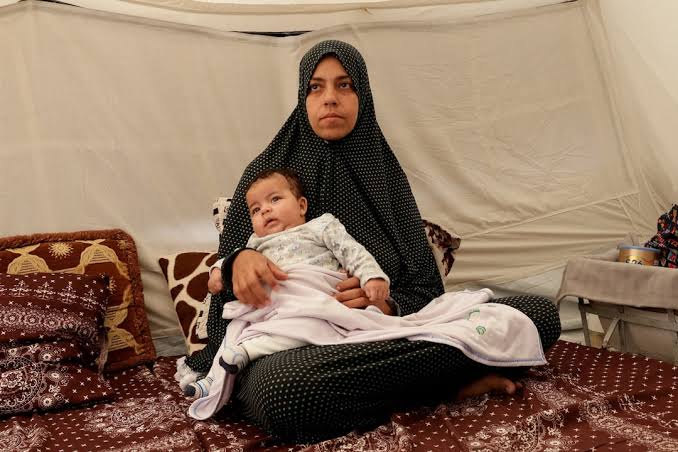GAZA – The death of four-month-old Palestinian baby Jenan Alskafi on Saturday has highlighted the escalating malnutrition crisis in Gaza. Jenan succumbed to malnutrition and digestive problems, conditions her doctor attributed to the impact of the ongoing Israeli blockade, which aid agencies warn is devastating the health of the entire population.
Dr. Ragheb Warsh Agha, from the Rantissi hospital in northern Gaza, stated that Jenan required hypoallergenic milk formula, a standard product that is now unavailable in Gaza. This formula was crucial to managing her chronic diarrhea, which led to severe malnutrition and weakened her immune system.
Aya Alskafi, Jenan’s mother, described her devastation at the loss of her baby, who she said lost nearly half her body weight in her final days.
Since the start of the conflict on October 7, 2023, Israel has significantly restricted the entry of supplies into Gaza. While some aid was allowed during a brief ceasefire in January, a complete blockade was imposed when military operations resumed in March.
Reuters has requested comment from the Israeli prime minister’s office regarding malnutrition levels in Gaza and reports of deaths among vulnerable individuals, including children needing supplements, due to the blockade, but has not yet received a response.
Israeli officials have stated that they do not believe Gaza is facing a hunger crisis, asserting that sufficient aid has been allowed into the territory. They have also expressed concerns about supplies falling under the control of Hamas.
The situation is further compounded by Israel’s plans to expand its military campaign, causing increased distress for displaced Gazans.
With limited access to fields and fishing waters, Gaza is heavily reliant on external food supplies. However, the last delivery permitted by Israel was on March 2, coinciding with the end of the ceasefire.
The United Nations and international aid organizations are warning of a looming catastrophe. The UN humanitarian agency OCHA reports that over 2 million people, the majority of Gaza’s 2.3 million population, are facing severe food shortages.
Malnutrition is disproportionately affecting children, pregnant women, and individuals with chronic illnesses, and is also hindering the recovery of those with war injuries, as aid supplies dwindle.
Jonathan Crickx, communications head at UNICEF, stated that approximately 9,000 to 10,000 children are currently being treated for malnutrition.
Hunger not only impairs children’s cognitive and physical development but also weakens their immune systems. With a large percentage of Gaza’s population displaced and homeless due to the conflict, the situation is particularly dire.
Crickx also noted the concerning trend of children scavenging for food in garbage, which increases the risk of preventable diseases.
The Gaza Health Ministry reports that at least 65,000 children are exhibiting symptoms of malnutrition, and the Gaza government media office states that at least 57 people, mostly children, have died as a result of malnutrition since the closure of crossings on March 2. These entities are both run by Hamas.
Reuters has requested comment from the Israeli prime minister’s office regarding these figures but has not yet received a response.
Wider Health Crisis
The impact of hunger extends beyond children.
Medical charity MSF reports an increase in patients with chronic diseases like diabetes and hypertension, whose conditions are exacerbated by a lack of food and essential nutrients.
An MSF clinic in Gaza City has also seen more patients with severe wounds whose recovery is hampered by limited access to food and clean water.
MSF medical coordinator Julie Faucon noted that patients are now requiring months of hospitalization for conditions that would typically be resolved in weeks under normal circumstances.
According to UN data, there are approximately 350,000 patients with chronic conditions in Gaza, including cancer and diabetes.
The Palestinian Red Crescent Society reports a critical shortage of medication for heart disease, hypertension, and diabetes, as well as a lack of nutritional supplements and infant formula.
The organization emphasized the dire conditions, stating that ambulances are struggling to operate and that the lack of food, water, medical supplies, and fuel is making survival increasingly difficult. They called for the urgent delivery of humanitarian aid to the Gaza Strip.
Pregnant women are particularly vulnerable. Ola al-Kafarna, a displaced pregnant woman, described experiencing dizziness due to lack of food and the scarcity of essential items.
A World Health Organization report from April indicated that between 10% and 20% of 4,500 surveyed pregnant and breastfeeding women are malnourished, leading to issues such as anemia, fatigue, and preterm labor.
Faucon added that mothers are not receiving enough calories and are struggling to produce milk, while infant formula is also difficult to obtain.



